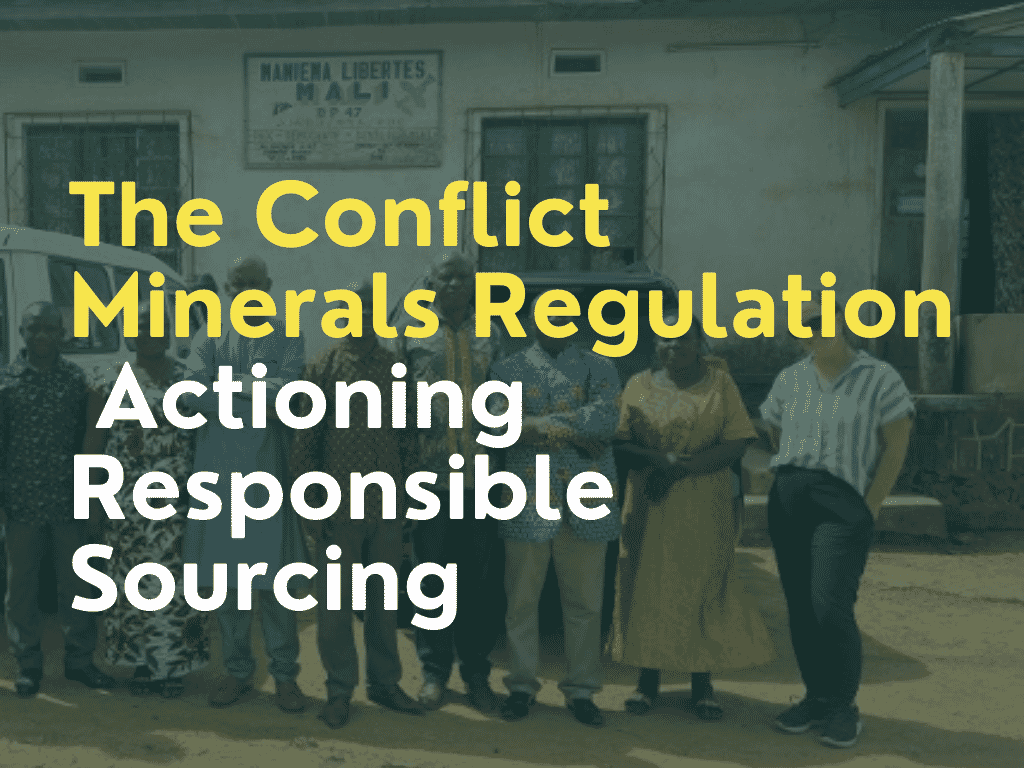
The Conflict Minerals Regulation | Actioning Responsible Sourcing

The Regulation aims to curtail opportunities for armed groups and security forces to benefit from the trade in tin, tantalum, tungsten, and gold (3TG). By establishing a mandatory European system for supply chain due diligence, the regulation seeks to prevent the financing of armed groups in resource-rich areas and avoid related human rights abuses by requiring responsible sourcing practices in the form of due diligence.
This first review provides insights into the functioning and effectiveness of the legislation. The review process was supported by an external study conducted by TDi Sustainability, in conjunction with the Responsible Sourcing Network and PACE, which can be found here. TDi’s team members led the review of the effectiveness and functioning of the Regulation in Europe – including its impacts on European importers of 3TGs – and during field visits and desk reviews of CAHRA and 3TG transit 10+ countries.
Key findings:
1. Complexity in implementation: The Regulation operationalises the OECD Due Diligence Guidance for Responsible Mineral Supply Chains in Conflict-Affected and High-Risk Areas (CAHRAs) into trade law using specific import customs codes. While the Guidelines are widely recognised in the 3TG sector, transforming the Guidelines into trade law means that a much wider array of actors – customs officials, Member State Competent Authorities, and European importers – needed to become familiar with the purpose and function of the Guidelines, as well as their technical implementation through customs declarations. This process required a great deal of learning and awareness raising on the part of the Commission, and there remain some challenges.
2. Limited direct impacts: The study identified limited impacts among local stakeholders that could be attributed directly to the Regulation. This is partly due to the Regulation’s design, which focuses on EU importers rather than actors further upstream in the supply chain. Raw 3TG supply chains only in very rare instances flow directly from CAHRAs to the European market. The smelting and refining of 3TGs in third countries meaning that most 3TGs traded are not in scope of the Regulation. Moreover, in stakeholder consultations in the Democratic Republic of the Congo, for example, it was impossible to attribute any increase in due diligence to the Regulation not just because of the scope, but also because the OECD Guidelines have been so widely circulated in the mining sector there for over a decade.
3. Increased awareness: There are indications of greater downstream interest to facilitate due diligence, which the regulation may have influenced. In Colombia – an OECD country – our field team found that there is a strong appetite across stakeholders like civil society, local regulators, and artisanal miners for additional awareness and capacity building around the Regulation.
4. Costs of compliance: While the regulation has imposed some costs on EU importers, particularly small- and medium-sized enterprises, the study suggested that potential recognition of due diligence schemes by the Commission could help lower these costs in the future.
5. Supporting measures: The review assessed the impact of measures such as the “Due Diligence Ready!” portal and the indicative, non-exhaustive CAHRA list published on behalf of the Commission, which aim to support companies in responsible sourcing.
This first review is at an early stage in the Regulation’s implementation and many aspects of its impact are still unfolding. The review therefore provides useful indications on the functioning and effectiveness of the Regulation. Looking ahead, the European Commission has identified areas for further evaluation and potential improvement, which include boosting engagement and awareness-raising efforts around the regulation and its objectives, strengthening on-the-ground communication about the Regulation, and supporting relevant development projects. Moreover, it will be interesting to watch how the implementation of the Conflict Minerals Regulation informs the Commission’s implementation of other, newer sustainability legislation. Like the CMR, the Corporate Sustainability Due Diligence Directive, the Corporate Sustainability Reporting Directive, and the Regulation on Deforestation-Free Products, function through national competent authorities of the different EU Member States, and their work is vital to enforcing these pieces of legislation in a coherent, effective manner. The CMR will surely provide interesting lessons learned as a forerunner among these sustainability regulations.
Both the European Commission review and the supporting study by TDi are available on the Regulation’s website. As the EU continues to refine its approach to responsible mineral sourcing, this review serves as a crucial stepping stone in ensuring the effectiveness of the Conflict Minerals Regulation and its role in promoting ethical supply chains globally.
TDi’s expertise extends to regulatory insights, digital tools, responsible sourcing research, and human rights strategies, all crucial for companies navigating regulations such as the Conflict Minerals Regulation. We can also advise on cross-compatibility with other EU Regulations, including the CSDDD, CSRD, the Batteries Regulation, EU Forced Labour Regulation, and the Critical Raw Materials Act. Our involvement in producing the study for the European Commission’s review of the Conflict Minerals Regulation enables us to offer detailed insight into understanding and implementing the requirements of the Regulation, and to provide the tools to effectively communicate compliance efforts to all stakeholders. Get in touch for more information.